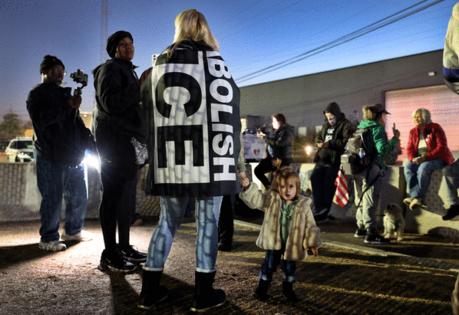Sharp drop in detainees at ICE facility in Broadview follows temporary restraining order
Published in News & Features
CHICAGO — The number of detainees held at the U.S. Immigration and Customs Enforcement processing center in Broadview has dropped precipitously since a federal judge ordered the government to comply with requirements to improve conditions at the facility, with only four people held there as of Tuesday morning.
The figure came out during a court hearing Tuesday at the Dirksen U.S. Courthouse, illuminating one aspect of the notoriously opaque operations at the west suburban facility. A government lawyer gave the court the new headcount at the controversial site, which has attracted protesters for months.
In a class-action lawsuit filed last month, attorneys called the processing center a “black box” where detainees were crammed into dirty holding cells with not enough food and water, among other problems. U.S. District Judge Robert Gettleman ordered the Department of Homeland Security to comply with a temporary restraining order that mandated the government to clean the cells regularly, provide enough food and water as well as bedding to any detainee housed overnight.
The two-story building is meant as a temporary stopping point following an immigration arrest, but as the Trump administration sought to increase deportations throughout the summer and during Operation Midway Blitz, the facility became so overcrowded, the lawsuit alleges, that detainees couldn’t lay down to sleep at night.
Attorneys for the detainees are seeking detailed data about the number of detainees processed and held at the facility over time, but during a daylong hearing earlier this month, detainees recounted times during which more than 150 people were crammed into a holding cell.
“I understand there are a lot fewer people there,” Gettleman said during the hearing, adding that it is probably an “understatement.”
Attorneys for the government had objected to the temporary restraining order, arguing that it would limit its ability to enforce immigration law in Illinois, given that the Illinois TRUST Act prohibits the federal government from contracting with state or local facilities to house immigration detainees.
During a site visit last week ordered by a federal magistrate judge, around 20 detainees were at the facility.
During the Biden administration, the facility typically held a handful of people or fewer per day, often for a few hours before they were transferred elsewhere, according to a Tribune analysis of ICE data provided to the Deportation Data Project.
But the facility’s holding rooms became far more crowded, for much longer, after Trump took office.
It can be difficult to tell precisely how crowded because ICE hasn’t released any data since mid-summer. But that earlier data showed that daily populations, measured by the Tribune at noon each day, once topped more than 100 people during a June peak that left many packed in the large cells for days with no beds or showers.
Still, even under the Trump administration — at least in the months before the Midway Blitz — the noontime population could also occasionally drop to less than a few people. That was likely due to the streaky nature of enforcement at the time and the Broadview facility’s ability, when not overwhelmed with arrests, to quickly send detainees to places meant for overnight stays, with beds, showers and hot food.
Though the government previously reported it is looking into a food vendor for the facility, Assistant U.S. Attorney Patrick Johnson said the government is reviewing its necessity given the current low numbers.
Gettleman said the drop in detainees would make it easier for the government to comply with the restraining order, but noted that — even though Border Patrol Cmdr. Gregory Bovino and agents under his command have departed Chicago — he has read reports that immigration agents may surge in Chicago in the spring.
“Obviously they can’t take our winter,” Gettleman said.
The lawsuit, which was filed behalf of former detainees Pablo Moreno Gonzalez and Felipe Agustin Zamacona, was certified as a class action by Gettleman on Monday.
Attorneys are seeking to depose key governmental officials and obtain security footage in order to learn more about the facility, which has been closed off to immigration attorneys, Congress members and faith leaders.
Gettleman has scheduled a December hearing for a potential preliminary injunction, which, if granted, could provide for longer-lasting measures to remedy the situation at the facility.
Meanwhile, as protests regularly continue to unfold outside the building, the village of Broadview announced it would close off a section of Beach Street outside the facility, expanding the area available to protesters while keeping them safe from vehicle traffic.
The announcement, made on behalf of the unified command of Illinois State Police, the Cook County sheriff’s office and the Broadview Police Department, came days after a skirmish there Friday led to multiple officers being injured and the arrests of 21 people.
Starting Wednesday, traffic for local businesses will be rerouted around the street closure.
Government attorneys have pointed to the protests as a reason for prohibiting immigration lawyers from meeting with clients in person at the Broadview facility, but counsel for the plaintiffs have pushed back on the notion that the protests pose a significant safety risk to attorneys who would enter and exit the building.
____
©2025 Chicago Tribune. Visit at chicagotribune.com. Distributed by Tribune Content Agency, LLC.







Comments